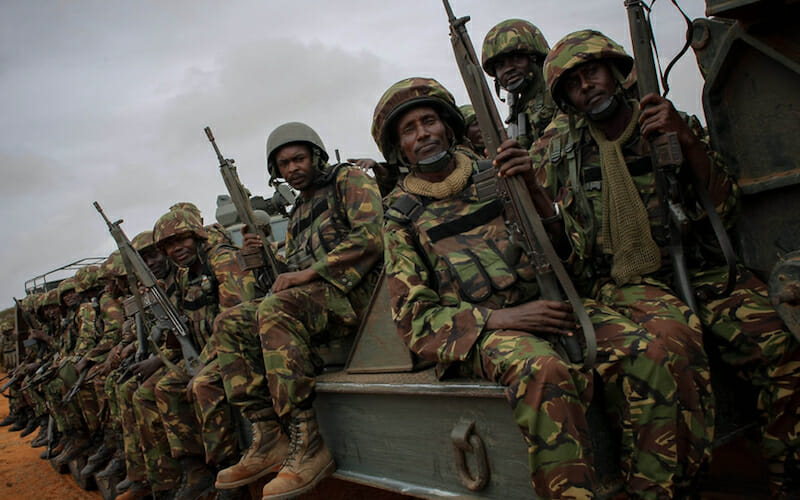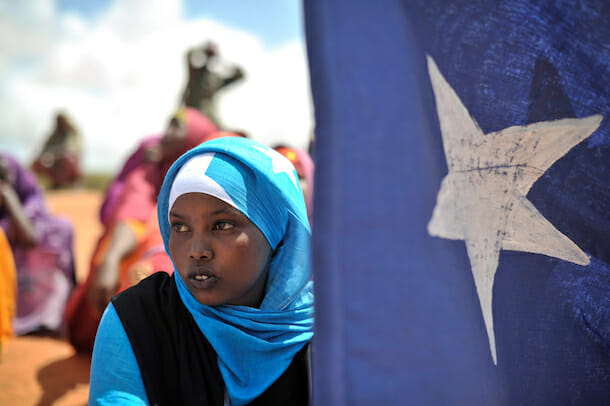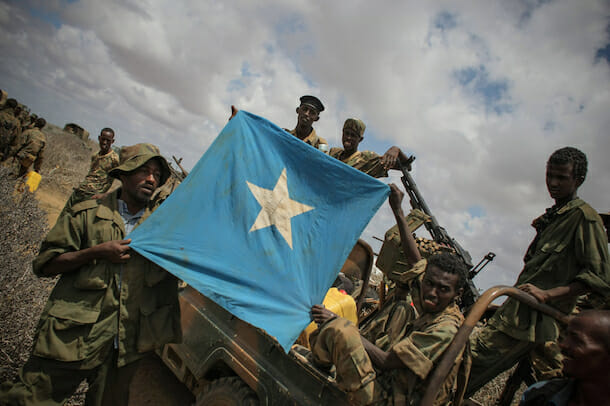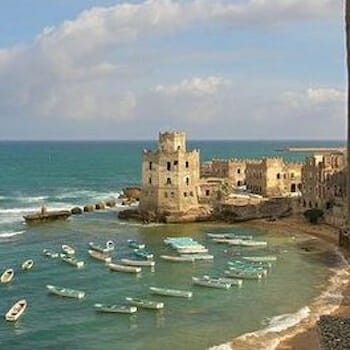
For AMISOM, Somali Women are Spoils of War
“You must be gentle with her, Faarah, she is still deeply traumatized,” said Mama Aisha as we approached the rusty green gate of a decrepit building in Mogadishu’s old Hamarweyne district. It was past 5 p.m. and the setting sun’s crepuscular rays, streaming through the gaps in the clouds, converged upon the war-ravaged city, giving it a golden hue.
Mama Aisha, an outspoken human rights activist and counsellor who works with rape victims in Mogadishu, brought me here to talk to Zara, one of the victims in her support group who was brutally gang-raped raped by four African Union soldiers two years ago.
At 56, Mama Aisha was bustling with youthful vigor and exuberance, maintained an air of affability about her and—although she did not need it—always carried a stout walking stick in her hand. Her face, accentuated by the fading, black-rimmed glasses that gently sat on the bridge of her nose, glowed in the sun. Working with a group of women, she provided both physical and psychological support to the victims of rape and sexual violence.
Footsteps quickly approached the gate as we knocked, followed by a prolonged clanking of metal and a rasp of a bolt. The gate creaked on its hinges and opened slightly. Mama Aisha entered the house, greeted a woman and, after a while, signaled for me to enter. Quickly, the woman bolted the gate behind us and led us down a tight corridor, past a lively chicken coop towards a dark room in one of the far corners of the house.
“Faarah,” said Mama Aisha, “meet Zara. Zara, this is the journalist I had told you about.”
She lifted the curtain and opened the window to let some light into the room.
Draped in a dark-blue Hijab, Zara (not her real name), who agreed to talk to me on condition of anonymity, sat anxiously on a wooden stool beside Mama Aisha. Her face conveyed a deep, lurking fear and insecurity and getting her to talk about her ordeal was not easy. She spoke quietly, casting a suspicious eye on my notebook and answering in low, monosyllabic tone.
“It is O.K,” said Mama Aisha gently coaxing her, “It is O.K. don’t be afraid, he just wants your story to be heard, that’s all.”
Zara relaxed slightly, seemingly nodding her head. With a disconsolate look on her face, she slowly, and somewhat hesitantly, recounted her harrowing experience.
“My child was not feeling well,” she said, pointing to one of her daughters who was playing in the compound, “and I did not have enough money to buy her medicine.”
“So I took her to the hospital in AMISOM base for treatment.”
“I was also pregnant and experiencing severe pains and I was told that AMISOM provided free medical care.”
Deployed with the approval of the United Nations in 2007 to help support the then fragile transitional federal government in the war-torn capital, African Union Mission in Somalia (AMISOM) is multi-national peacekeeping force with a mandate to bolster the federal government of Somalia in its war against Al-Shabab. Soldiers for the mission are primarily drawn from the neighboring countries—Uganda, Burundi, Kenya, Djibouti and Ethiopia—while funding is provided by the US, UK European Union and United Nations. AMISOM contingents receive extensive training at the hands of British and American military instructors.
As part of a strategy to winning hearts and minds, AMISOM operates a string of medical units from inside their military bases in Somalia. Women trying to access medicine or humanitarian services at the bases, however, have routinely been subject to sexual exploitation, abuse and even rape at the hands of AMISOM soldiers.
At the AMISOM base, Zara—who was in the second trimester of her pregnancy—described her ailments and the child’s symptoms to an AMISOM doctor through a Somali interpreter.
“They took my child away from me and gave her some porridge, and then they led me to a large tent in a corner and told me to wait,” she continued.
Ten minutes later, she was approached by the interpreter and, walking behind him, a bulky African Union soldier. The interpreter offered her money to have a “relationship” with the soldier but Zara, torn between incredulity and anger, vehemently refused the offer and resisted the soldier’s advances. The soldier then turned aggressive and began threatening her.
“I shouted at him and tried to leave the tent but he pulled me back and…,” she buried her face in her hands and broke into tears.

The soldier then lunged at her, pulled her by the headscarf and ordered the interpreter to leave the tent before forcefully thrusting himself upon her. Her face twitched and her hands trembled as she described her ordeal.
“It’s O.K. my dear,” said Mama Aisha, “it’s O.K.”
“I was handcuffed to the bed post,” Zara continued tearfully between sobs, “I couldn’t move. I just cried.”
The officer, she said, beat her severely when she resisted and raped her with a baton firmly clenched in his hands.
Zara’s account is consistent with the testimonies of other rape victims in AMSIOM base camps documented by Human Rights Watch (HRW). In its 71-page report, “The Power These Men Have Over Us,” HRW uncovered evidence of sexual exploitation of women by African Union soldiers and has documented high levels of sexual abuse and exploitation, stating that AMISOM soldiers “have abused their positions of power to prey on the city’s most vulnerable women and girls.”
According to the report, AMISOM soldiers traded food for sex and gang-raped women and girls as young as 12. AMISOM soldiers, “relying on Somali intermediaries, have used a range of tactics, including humanitarian aid, to coerce vulnerable women and girls into sexual activity,” the report said. “They have also raped or otherwise sexually assaulted, women who were seeking medical assistance or water at Amisom bases.”
Weak and exhausted, Zara fell and crumpled into a heap on the floor. She curled into fetal position and, writhing in agony, firmly pressed her stomach with both her hands to relieve the agonizing pain she felt. Her ordeal was over but her whole body throbbed with pain.
“I couldn’t move at all,” said Zara wiping tears from her eyes, “I felt as though someone had trampled all over my body.”
Lying on the floor, Zara heard the clack of heels walking past the tent. Two young Somali women were talking to some AMISOM soldiers on their way to another tent. A few minutes later, the footsteps of approaching soldiers jarred the silence. The interpreter returned with one of the soldiers and stood at the entrance of the tent. The soldier stepped forward.
“Here!” he shouted, extending her a ten-dollar note in his hand, “take it and get out.”
It was a propitiatory gesture to keep her silent. She did not move, so he threw the money at her.
“If you say a word to anyone,” he added, “I will kill you.”
Standing with great difficulty, Zara gathered herself and heaved her black handbag onto her shoulder. Handing over the child and a bag of medicine, the doctor—who waited for her outside the base—quickly left the scene. Zara tottered unsteadily between the tents and out of the base as if nothing had occurred. The officer who had raped her followed her until she left the base. As she hobbled past the guards at the gate, a dark, lanky Ugandan soldier bade her farewell.
“Ma’salama” he said, smiling and winking at her.
“Double victimization”
Sexual violence is pervasive in Somalia and the prolonged conflict increasingly makes many Somali women and girls vulnerable to sexual violence. In 2012, the United Nations (UN) recorded over 1,700 cases of rape in camps for displaced people. Members of the security forces carried out the bulk of these rapes. In the first six months of 2013, the UN reported nearly 800 cases of sexual and gender-based violence in Mogadishu alone.
According to the UN report, rape victims in Somalia face what is referred to as “double victimization” by the UN’s independent expert on human rights in Somalia—first the abominable rape or sexual assault itself, then failure of the relevant authorities to provide effective justice and support to the victim of rape.
The victims also bear the social stigma because of the rape, leading many—including the government—to blame the victim of the rape rather than the rapist. When Zara confided in one of her relative she trusted, she was chastised for seeking medicine from the “African infidels.” Zara—unable to transcend the inhibitive social expectations—kept her silence since then. She now lives in fear, physically secluded and emotionally estranged from her family.
Back in the room, it was uncomfortably silent. An old brown curtain flapped behind Mama Aisha as she prepared some tea, the clinking of the spoon in the glass piercing through the silence.
The poignant image of a disconsolate Zara imbued the room with in an air of melancholy, sharply contrasting against the laughter of the children frolicking in the compound.
Lifting her head up, Zara turned towards Mama Aisha.
“It’s all my fault,” she said with a pained expression on her face, “It’s all my fault. I shouldn’t have gone to the infidels.”
“No it is not, Zara,” replied Mama Aisha, consoling her, “it is not your fault, so do not blame yourself. It is what God had decreed.”
Zara had a miscarriage and the sense of loss she felt was irreparable.
“Did you report the incident to the authorities?” I asked.
She turned towards me, but did not reply. She simply stared into the abyss in front of her, inadvertently wrapping the frayed edges of her Hijab on her thumb.

Prosecuting African Union soldiers for human rights abuses or rape is impossible, as the Somali government has no jurisdiction over the troops. AMISOM forces—including their local interpreters—have complete immunity from all legal processes in Somalia. While the troop-contributing countries exercise jurisdiction over their troops for any criminal offenses committed in Somalia, allegations of rape and sexual exploitation AMISOM soldiers are rarely investigated and almost never prosecuted.
A prolonged silence ensued. Zara lifted her gaze slowly towards the ceiling. An old, dark light bulb dangled from the middle of the dusty wooden joists that barely held the corrugated iron sheets together.
Interwoven along the length of the wooden planks crisscrossing the tiny room, were a series of cobwebs, some finely woven, others hanging by a single strand. In one of the corners, a large spider glowered down at us as it spun its yarn, methodically moving through the spiral of threads in a circular motion, before settling in a corner, waiting for a potential prey.
A ray of sunshine shone through the half-open window, projecting Zara’s shadow on the concrete, and a faint breeze wafted through it, blowing the dust that had gathered on the disintegrating windowsill. Zara, as if recovering from a trance, let out a deep sigh.
“The interpreter was a police officer,” she said, her eyes glinting with grief.
Local organizations and UN human rights groups have documented several cases where were Somali soldiers abducted young, helpless women and transferred them to AMISOM bases. There, the women were repeatedly gang-raped by AMISOM soldiers before being dumped onto the streets, according to HRW.
In addition to that, government forces often threaten and intimidate rape victims as well as journalists reporting on rape cases. When freelance journalist, Abdiaziz Abdinur Ibrahim, interviewed a 27-year-old woman victim of rape in Mogadishu’s camps for the internally displaced in 2013, the security forces arrested and later convicted him of falsely accusing a government body. His interviewee, the victim of rape, was also charged with making a false accusation. Since then, it has become common for the government to charge anyone who
reports incidents of rape by government soldiers with either “defamation” or “insulting a government body.”
“Rape by those in uniform isn’t rape; it is a sacred rite, protected by those in power,” shouted Mama Aisha indignantly.
“It is as if the government is protecting these people,” Mama Aisha continued, “Instead of arresting the rapist and treating him with the contempt he deserves, our government protects him and charges the victim for being raped.”
Zara, who was listening carefully, gently nodded her head in agreement.
Walking into one local police station, one Sunday morning, I witnessed Mama Aisha’s words breathe to life before my very eyes. The de facto government policy of “protecting” rapists and prosecuting the raped was still effective to this day. Apart from adding my name into the government’s list of “nosey journalists,” all my inquiries concerning rape by government soldiers were met with nonchalance and usual platitudes of “we are doing everything we can to investigate all cases.”
One police officer later threatened and warned me from pursuing the case further.
“You foreign journalists need to understand the local dynamics and stop spreading propaganda,” he growled.
“All this is Al-Shabab propaganda. So if you want to live in Somalia, you keep your mouth shut.”
Without proper investigations and with little regard for being held accountable for their crimes, Somali government forces are also notorious for their sexual violence against women in the internally displaced people’s (IDP) camps that are dotted in and around Mogadishu.
Forced to flee their homes by the constant threat of droughts and war, thousands of Somali women have sought shelter in Mogadishu’s IDP camps, while their husbands remained behind to look after their livestock and farms. The camps, however, do not have adequate security and have left the women vulnerable to a wide range of abuses, including rape by both government and AMSIOM soldiers and other members of the security establishment. Many of the young women who were either raped or coerced into sexual activity at AMISOM base camps, including Zara, had, at some point, lived in the IDP camps.
Exploiting loopholes within the judiciary and the victims’ unwillingness to come forward—partly due to fear of reprisal attacks—government soldiers in Mogadishu operate with impunity.
The IDP camps—dirty, damp and strewn with litter—are physically constrictive and the atmosphere equally stultifying. Thousands of young women and single mothers live trapped in a vicious cycle of dependency in overcrowded, squalid conditions, without adequate water and toilet facilities. Their homes, made of brittle twigs covered with a tarpaulin are prone to the harsh weather conditions. Without any significant assistance and protection from the governments, the displaced women and girls are often the victims of sexual violence.
Assailants, often wearing police uniform, prowl the dark, dingy alleyways of the camps, preying on young girls and lone women in the middle of the night. Members of the marginalized clans and young girls are particularly vulnerable when they leave the camps to forage for firewood. According to the UN Children’s Fund (UNICEF), about one-third of victims of sexual violence in Somalia are children.
“We are just the spoils of war”
The African Union mission in Somalia is embroiled in serious allegations of professional misconduct, sexual violence and rape. Like their Ugandan and Burundian counterparts, the Ethiopian military has been accused of committing systematic rapes against civilians—almost all of them Somalis—both in Ethiopia as well as in Somalia. Kenyan forces in Kismayo allegedly raped young girls at a checkpoint, while Djiboutian forces were accused of raping young Somali women in the town of Buloburte and then sharing the footage of the rape with their comrades. As is often the case, incidents of rape rise sharply in proportion to the territorial advance of AMISOM forces in Southern Somalia.
“It is their way of celebrating territorial acquisition,” said Mama Aisha vehemently.
“To them, we are just…” she paused for a moment and looked at Zara as she fumbled for the right word.
“We are just the spoils of war,” she said with a sigh.
Zara flinched slightly as Mama Aisha said those words.
“It is a case of the wolf tending to a herd of sheep in a fenced enclosure,” she added, her face crumpled with anger.
“When the wolf devours a young lamb, the sheep do not lodge a complaint with the predator. It is herd instinct,” she reasoned.
“What is worse than the wolves is the hound dog that hunts and catches the prey for the wolves to devour,” retorted Mama Aisha
“Without their obedient dogs, the wolves cannot prey on the vulnerable.”
The analogy was striking. In Somalia, however, the wolves were far too many.
The setting sun’s golden rays shone through the window, casting a golden shade on Zara’s face as she turned towards the window. An expression of sullen resentment adorned her face, imparting an aura of sadness to its otherwise natural glow. She looked down pensively, knitted her eyebrows, as though fetching her memories deep from the bottom of her soul. The recollections made her wince every now and then, but she managed to conceal her emotions.
Despite her seemingly stoic attitude, however, Zara continued to experience profound internal turmoil. The trauma she suffered has severely affected her life and the fear of being raped again bulked large in her thoughts. Now, more than two years after the attack, she is still haunted by images of her attackers.
“I still see their shadows in the dark,” she said, firmly clasping the edge of the Hijab with both her hands, “bulky, black figures.”
Like a recurring nightmare, the visions of the assault continue to prey on her mind and a paralyzing anxiety keeps her preoccupied. She finds it hard to sleep at night and avoids sleeping in a dark room.
“Like many of the young women I work with,” explained Mama Aisha, gently patting Zara on her shoulder, “Zara is vulnerable.”
“Apart from the social stigma, the attack critically damaged her social interaction and relationships with other people,” she continued.
“She suffers Post-traumatic Stress Disorder. She is paranoid about strangers and has a fear of men in military uniform.”
Zara, seemingly aloof and detached, stared out into the compound, as if she was not present in the room. Three of her daughters had gathered outside, playing a Somali version of hopscotch in the open. One of the daughters, perhaps bored, pranced into the room and threw herself on her mother’s lap. She looked at me, her eyes filled with incredulity.
“It is not very often that men come to this house,” said Mama Aisha.
My efforts of shaking her hand were rebuffed with a gentle shrug of her little shoulders.
“Go play outside, Hooyo,” Zara said after slathering some lotion on the girl’s face and hands. Hooyo is the Somali equivalent of mother.
In the compound, the neighbor’s polygamous rooster was desperately trying to initiate courtship with one of Zara’s hens in the large chicken coop. Aggressively waltzing in circles around the hen, the sturdy rooster lowered and boisterously flapped his wings until the hen was cowed into submission and the mating process began.
Zara’s youngest daughter, no more than 6 years old, scampered towards us clearly frightened by the raucous scene.
“Hooyo! Hooyo!” she cried with a childish innocence, “that black rooster is beating our hen.”
Zara, feeling awkwardly embarrassed, burst into laughter.
“Go help her, Hooyo,” she said with a chuckle, “but be gentle with her.”
Emboldened by her mother’s words, the little girl dashed out of the room, chased the rooster away and, with a triumphant leap, joined her sisters.
Zara watched them in earnest as they played, daintily skipping down the compound.

